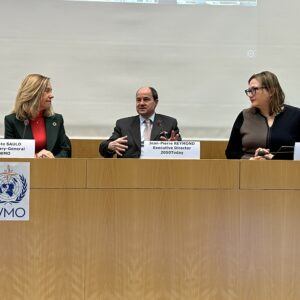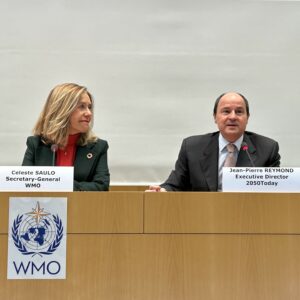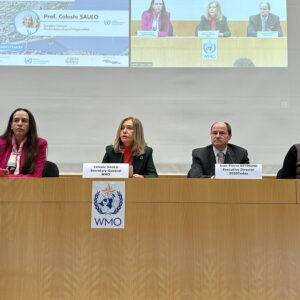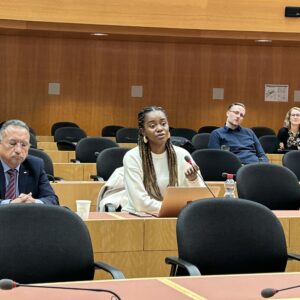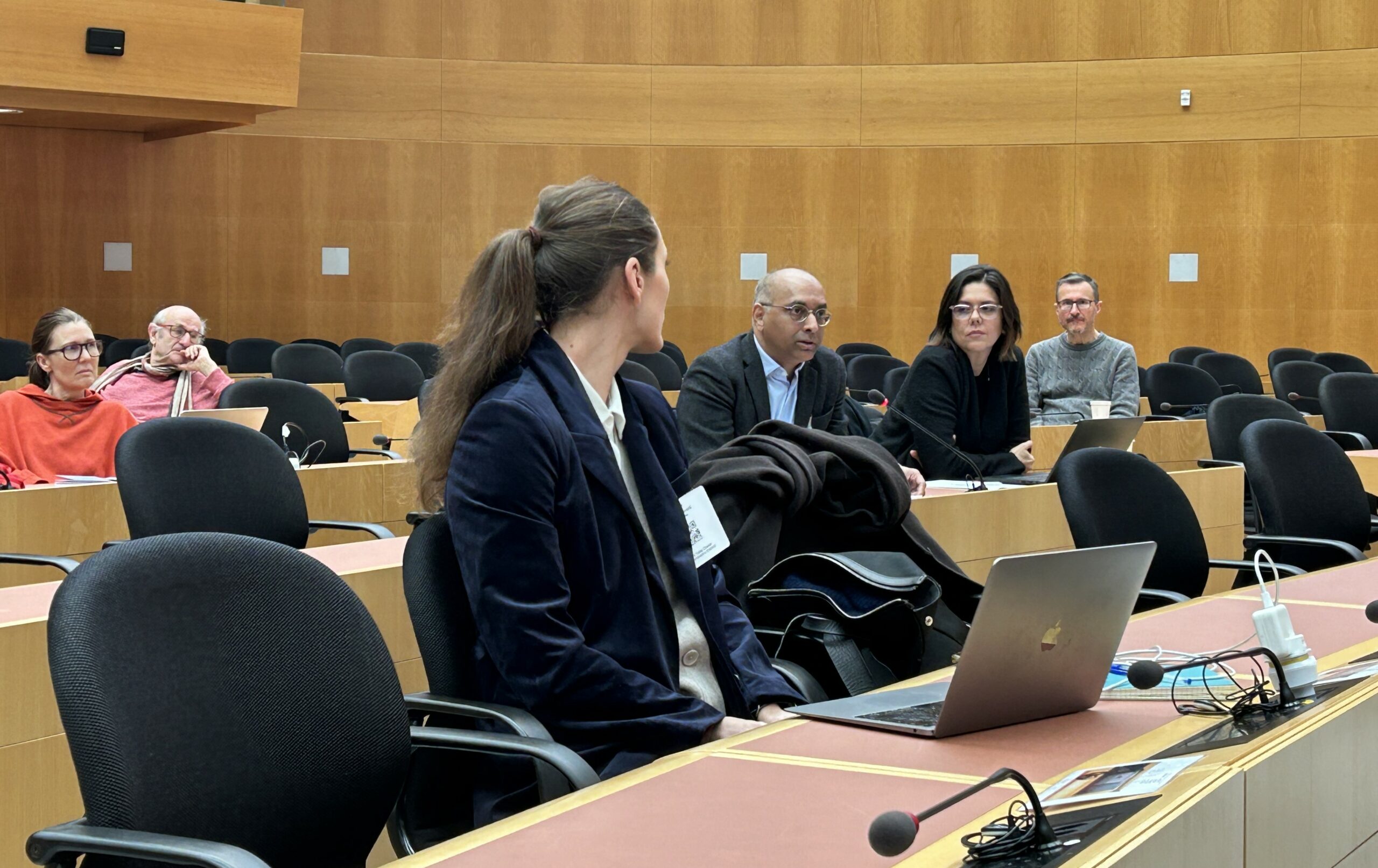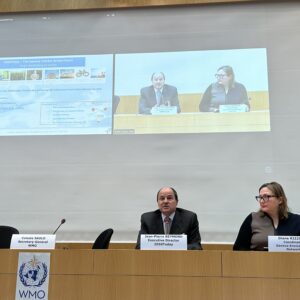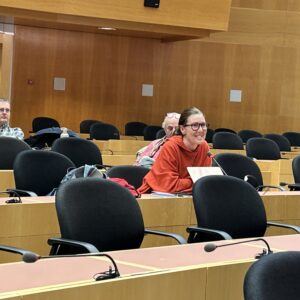Event Conference
United for Zero Emissions: The 2050Today Charter Explained

27 Feb 2024
10:00–12:00
Venue: WMO Headquarters | Room Obasi & Online | Webex
Organization: Switzerland, World Meteorological Organization, 2050Today, Geneva Environment Network
Organized by the Permanent Mission of Switzerland, the World Meteorological Organization and 2050Today, with the support of the Geneva Environment Network, this event presented the 2050Today Charter, and how it can support signatories in making their own contribution to achieving the needed decarbonization and be line with international recommendations.

About this Event
In the face of the triple planetary crisis of climate change, biodiversity loss and pollution, urgent action is needed at all levels to reverse the trend. To achieve the targets defined in agreed international agreements, including the Paris Agreement, the Global Biodiversity Framework and the Global Framework on Chemicals, an unprecedented transition is needed. The world must work together to address these crises.
Geneva is home to the world’s highest concentration of international organizations and diplomatic missions which, along with the hundreds of non-governmental organizations headquartered in the region, that form an exceptional density of global actors known as International Geneva. These institutions are contributing in terms of policy to develop ambitious actions to tackle these planetary crises. With the support of 2050Today, the host country and local authorities, and also from UN Greening the Blue, various actions are being taken to reduce the ecological footprint of these institutions, and walk the talk.
To strengthen the joint impact of international Geneva, the 2050Today Charter was drafted by 2050Today, the Geneva Climate Action Forum, in cooperation with the participating institutions, the relevant Swiss authorities and expert partners, to provide a common framework for action.
Organized by the Permanent Mission of Switzerland, the World Meteorological Organization and 2050Today, with the support of the Geneva Environment Network, this event presented the 2050Today Charter, and how it can support signatories in making their own contribution to achieving the needed decarbonization and be line with international recommendations.
About the 2050Today Charter
Drafted by 2050Today, the Geneva Climate Action Forum, in cooperation with the participating institutions, the relevant Swiss authorities and expert partners, the Charter has been formulated in such a way as to enable any institution, whatever its size, legal framework or resources, to participate. It does not imply any legal or financial obligation. It was signed in December 2023 by an initial group of 40 international Geneva institutions. The Charter establishes a common framework by enabling each institution to:
- Adopt five global principles demonstrating its contribution to decarbonisation;
- Have access to a wide range of concrete and specific actions through guidelines;
- Design its own action plan to reduce GHG emissions by setting individual targets based on its own climate references;
- Benefit from coordinated support providing targeted resources in terms of knowledge and monitoring;
- Promote greater visibility by jointly communicating the climate action of international Geneva.
Full details of the document, its signatories and its content can be found here. To strengthen our joint impact, the Charter is an invitation to embrace this common initiative and become one of the leading international Geneva institutions for climate action. It is open for signature to all International Geneva institutions.
Agenda

Prof. Celeste SAULO
Secretary-General, World Meteorological Organization
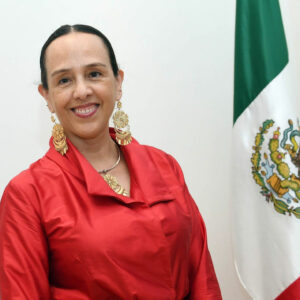
H.E. Amb. Francisca E. MÉNDEZ ESCOBAR
Permanent Representative of Mexico to the United Nations Office in Geneva

Jean-Pierre REYMOND
Executive Director, 2050Today

Diana RIZZOLIO
Coordinator, Geneva Environment Network
Remarks and Statements
Prof. Celeste SAULO | Secretary-General, World Meteorological Organization
The Importance of Reducing Emissions to Keep the 1.5° Target
- We are happy to welcome the 2050today initiative and honored to host this meeting at WMO headquarters.
- We are very fortunate to be here. In this amazing building, opposite the lush Botanical Gardens, next to the lake and in the wonderful city of Geneva.
- WMO is a proud signatory of the 2050 Charter and is fully committed to being part of the journey towards climate neutrality and environmental sustainability.
- The climate crisis is the defining challenge of our time and something I care passionately about.
- There is a rapidly closing window of opportunity to secure a sustainable future. Without urgent action, we will miss the 1.5° Celsius target of the Paris Agreement.
- To achieve this, CO2 emissions from human activities must decline by about 45% from 2010 levels by 2030 and reach net zero around 2050. The long lifetime of CO2 in the atmosphere means that concentrations will remain high even if emissions decline. Our actions today will have impacts for many future generations.
- Far-reaching transitions in energy, land, transport systems, in urban planning and buildings are essential.
- For example, the Intergovernmental Panel on Climate Change Working Group III report on Mitigation of Climate Change states that between 1990–2019, global CO2 emissions from buildings increased by 50%.
- This is due to a combination of direct emissions from heat, as well as from cement and steel production.
- The good news is that Nearly zero energy (NZE) buildings or low-energy buildings are possible in all climate zones. And they are possible both for new and retrofitted buildings, according to the IPCC.
WMO’s Journey Towards Climate Neutrality
- WMO started its long journey towards climate neutrality in 1999. Our wonderful WMO headquarters was built 23 years ago. It was heralded for both its ground-breaking architectural design and its energy efficiency.
- We are currently going through a new process of rejuvenation and modernization in accordance with todays’ technology and needs.
- WMO is in the process of connecting to the GENILAC network. This is a 100% renewable thermal solution, which will allow us to heat and cool the building with water from Lake Leman using state-of-the-art heat pumps.
- In addition, photovoltaic panels will be installed on the roof. This will allow us to produce up to 6% of our electrical annual consumption. We are also replacing and upgrading the building management system to enable a more controlled and comfortable work environment.
- This modernization will speed the WMO transition to geothermal energy and renewable electricity sources for our heating, ventilation, and cooling needs.
- Our aim, also embedded in our Strategic Plan, is to reduce energy consumption by 20 to 30% by 2027.
- Building management is only part of the transition.
- As the new Secretary-General, I am considering ways of managing air travel. This would reduce our carbon footprint and has cost-saving benefits for our Members.
- Investments in top-notch video-conferencing technology has allowed for larger online meeting participation. We are looking at further improvements in this front.
- WMO’s total Greenhouse Gas emissions in 2022 were 2’170 tons of CO2 equivalent, including travel and headquarters activity. This compares to 4’609 tons of CO2 equivalent pre-covid (2019).
- WMO is part of the Greening the Blue initiative, led by UNEP, on greater environmental sustainability in the management of its facilities and operations.
- WMO has set up the basis for an organizational-level Environmental Management Strategy, as well as a Net Zero plan that will be conceived soon.
- At an individual level, many of our staff cycle, walk or use public transport to get to work. The full bike racks are evidence of that. The WMO cafeteria has given staff members a free mug to cut the use of disposable mugs and has more vegetarian options.
- I will encourage closer cooperation with the Staff Association to Go Green.
- WMO is happy to host the 2050Today event here today. We are committed to best practices and sustainability efforts shared throughout Geneva.
H.E. Amb. Francisca E. MÉNDEZ ESCOBAR | Permanent Representative of Mexico to the United Nations Office in Geneva
- Let me begin by congratulating Prof. Celeste Saulo on her appointment as the first woman to lead the WMO Secretariat General and wishing you every success. As Permanent Representative of Mexico, and as gender champion, count with us to promote and mainstream the gender perspective in climate policies and to unite efforts to advance the WMO’s actions to address the planet’s most pressing concerns.
- Likewise, I would like to express our recognition to Executive Director Jean-Pierre Reymond and your team for your leadership in steering 2050Today to support the decarbonization of International Geneva, as well as the Permanent Mission of Switzerland for inviting us to join this initiative back in 2019.
- Few months ago, we signed the 2050Today Charter because we are convinced that it contributes to materialize our countries and our personal climate action commitments to sustainability with a sense of solidarity and cooperation, through implementing common and customized solutions and benefiting from research. It also exemplifies the kind of commitment, science-based tools, and collective support required for climate action to take place, which is why the Permanent Mission of Mexico was pleased to join the project behind this initiative and signed the 2050Today Charter today.
- Since we joined the 2050Today, the realization of the carbon footprint impact of our daily patterns of consumption, and, in many cases, misuse of facilities, energy, and office supplies, had a significant effect not only at the workplace, but also on our daily lives. Since 2019, the results encourage us to continue developing concrete measures to embrace sustainable policies and behaviors, which no doubt will be strengthened through our upcoming action plan.
- Since 2019 we have introduced new policies for our events and at our offices, we have a waste management program in place, we promote sustainable food consumption both in our offices and our events, we are constantly encouraging employees to reduce energy consumption, walk, cycle, use public transport or even carpool. These actions have brought excellent results and invited us to be more rigorous in reducing our emissions.
- We have a Good Practices Handbook which is a contribution of the Permanent Mission in Geneva that aims to promote the participation and enthusiastic involvement of all our colleagues at the Mission, so that awareness and change of many of our habits are an important component of our planning, to promote more sustainable practices, and be aware of the climate crisis, and to achieve together a sustainable behavior.
- We are developing a mobile application to promote these practices while allowing a marketplace to exchange products for reuse or recycling among all the employees in the Permanent Mission.
- Mexico conceives its commitment to fighting climate change through global awareness to transition to sustainable models based on a human rights approach, gender perspective and respect for future generations and will gladly contribute to every effort aiming to foster the right to a clean, healthy, and sustainable environment.
- Mexico is pleased to voluntarily commit to contribute to the decarbonization of Geneva, while we hope for more to join and continue to enrich the information exchange as well as good practices, we seek to increase the impact of our individual efforts.
Diana RIZZOLIO | Coordinator, Geneva Environment Network
- This timely event under the auspices of the World Meteorological Organization and 2050Today brings us together to highlight the importance of walking the talk on what we are promoting as policymakers in international Geneva and beyond.
- As we are meeting here, the United Nations Environment Assembly, which is the world’s highest-level decision-making body on the environment is convening in Nairobi, for its 6th session, looking at “Effective, inclusive and sustainable multilateral actions to tackle climate change, biodiversity loss and pollution”, and addressing the interlinkages of these three planetary environmental crises the world is facing.
- Other important assemblies on the environmental action agenda are also convening this week . The Secretary-General and the president of the General Assembly are in Geneva this week for the Human Rights Council and the trade community is attending the World Trade Organization 13th Ministerial meeting in the United Arab Emirates.
- Indeed, in the face of this triple planetary crisis of climate change, biodiversity loss, and pollution that we are facing, urgent action is needed at all levels to reverse the trend, as the Secretary-General and the head of the United Nations Environment Programme regularly remind us.
- For this, we have targets defined in agreed international agreements, including in the Paris Agreement on climate change and we have also the Global Kumming-Montreal Biodiversity Framework and the Global Framework on Chemicals. To achieve these, an unprecedented transition is needed. The implementation of these frameworks is essential.
- We are here in Geneva, home to the world’s highest concentration of international organizations and diplomatic missions which, along with the hundreds of non-governmental organizations headquartered in the region, form an exceptional density of global actors contributing in terms of policy to develop ambitious actions to tackle these planetary crises. Only for environmental action over 100 organizations are engaged in policy making
- It is important that we also walk the talk of what we are promoting as policies. Although the description of this initiative focuses on reducing emissions and mobilizing climate action of our Geneva institutions, the initiative has developed and now also looks into Biodiversity, Food, Mobility, Sustainable procurement and waste Management, thus addressing all three crises I have mentioned.
- The initiative complements other initiatives launched by United Nations entities and networks of embassies, providing a platform for exchange and raise ambition. This is is why initiatives such as 2050Today, are essential. Initiatives that are important and relevant in our discussion:
- The United Nations Greening the Blue initiative, supports the United Nations System in the transition towards greater environmental sustainability in the management of its facilities and operations. Under this umbrella, the United Nations agencies in Geneva and around the world are fully engaged to support efforts to reduce their footprint, under the coordination of our colleagues of the Sustainable United Nations team, which is based here in Geneva.
- Five years ago, under the leadership of the UN Secretary-General, the UN’s Chief Executives Board for Coordination endorsed the first Strategy for Sustainability Management in the United Nations system 2020-2030, which demands that the UN ‘walks the talk’ on sustainability across all its activities and operations. Colleagues in charge of sustainability from all UN institutions meet regularly to prepare the annual Greening the Blue Report, summarizing the actions they have taken and results achieved. This important work as mentioned is coordinated by our colleagues from the SUN, which is also engaged in the 2050Today initiative.
- Some of our UN institutions here in Geneva are more than 75 years old and are hosted in buildings that don’t always benefit from the latest technology. The efforts and support provided by the host country to renovate or build new infrastructure to fit to new realities needs also to be highlighted.Various Member States also benefit from green diplomacy initiatives of their own countries. Various green embassies networks or initiatives exist, allowing them to find innovative solutions to reduce their footprint. These experiences can benefit others when shared through the 2050Today initiative.
- 2050Today, can help foster the synergies among the various initiatives that are in place.
- We have seen how other initiatives such as the International Gender Champions, have provided a real transition as it has contributed, in this case, to concrete commitments and gender parity in the senior management of the United Nations.
- I represent international Geneva at the Conseil du Climat of the Canton of Geneva. This council made 13 propositions to improve the climate plan of the Canton of Geneva and welcomes the efforts of all the stakeholders involved.
Jean-Pierre REYMOND | Executive Director, 2050Today
For a full understanding of the intervention, you may consult the presentation made during the event.
Historical Perspective of the Human Carbon Footprint and its Impact on our Environment
- Six of the nine planetary boundaries have been exceeded and almost two-thirds of the earth are degraded by human overexploitation.
- The 2050Today Charter provides a way to contribute to the needed climate action and represents a frame of reference designed to support participating institutions in their journey towards decarbonization. The document represents 2050Today’s commitment to harnessing its influence and extensive network to unite institutions, along with key actors and stakeholders in International Geneva, in fostering sustainable practices and behaviours towards effective climate action.
- The Charter establishes a unified framework, outlining specific objectives, actions, and targets that each participating institution can adapt to create a tailored action plans to reduce greenhouse gas (GHG) emissions. It further provides essential guidelines to assist staff and suppliers in grasping the environmental and climate impacts of their activities. In particular, it addresses the possible implications on the energy used, the means of transport chosen, the products selected, the food offered, the ICT used, the waste produced, the biodiversity protection and the behavioural changes that might be required.
- The Charter signatories express their resolve to fulfill these five principles:
- Measuring regularly the carbon footprint of their activities;
- Carrying out an initial measurement of your situation on one or possibly more sustainability sectors of the Charter;
- Defining their own Action Plan and implement it to reach your corresponding targets;
- Sharing their Action Plan with 2050Today and reporting on the set sustainability topics;
- Communicating their climate action.
- The Charter has been drafted with the contribution of the 2050Today participating institutions, the relevant Swiss authorities and expert partners. Its content is the sole responsibility of 2050Today. The Charter was adopted by its first signatories on 5 December 2023. It is proposed to be a common framework and to provide practical guidelines, without any legal or financial obligations.
- The 2050Today Charter is available online and is open for signature to all International Geneva institutions. The 2050Today team welcomes any questions or remarks, please write to: contact@2050today.org
Highlights
Video
Live from WMO
Live in the Room


